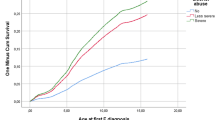Summary
We carried out a population-based prevalence study to assess the association between the presence of alcohol-related problems within the family and the risk of disorders in the children's global functioning level. We enrolled 394 children attending nursery, primary and secondary schools and their parents living in two municipalities in Central Italy. Alcohol-related problems within the family were reported by registered records obtained from general practitioners and teachers, who were considered as preference raters. The childrens level of functioning was assessed by teachers, who attributed to each school child a score according to the Children Global Assessment Scale (CGAS). The number of reports of alcohol-related problems within the family and the CGAS scores were considered, respectively, as independent and dependent variables in a multiple logistic regression model for ordinal outcome variables. The children's sex and age, and the age of their parents, the duration of the parents' education and family size were considered as covariates. We found a strong association between a poor level of functioning in the children in the social environment and alcohol-related problems within the family. The pravalence odds ratio (and 95% confidence interval) decreased from 0.5 (range 0.2–1.3) for children whose families were reported by one rater to 0.4 (range 0.2–0.8) for children whose families were reported by two raters, the non-reported families being the reference category, suggesting that the level of functioning of the child decreased as reports of alcohol-related problems in the family increased.
Similar content being viewed by others

References
Tarter RE (1989) Specific cognitive impairment in sons of early onset alcoholics. Alcohol Clin Exp Res 13: 786–789
Steinhausen HC, Gogél D, Mestler V (1984) Psychopathology in the offspring of alcoholic parents. J Am Acad Child Adolesc Psychiatry 23: 465–471
Lamminpaa A, Vilska J (1990) Alcohol intoxication and psychosocial problems among children. Acta Psychiatr Scand 81: 468–471
Schulsinger F, Knop J, Goodwin DW, Teasdale TW, Mikkelsen V (1986) A prospective study of young men at high risk for alcoholism. Arch Gen Psychiatry 43: 755–760
Nylander I, Rydelius PA (1981) A comparison between children of alcoholic fathers from excellent versus poor social conditions. Acta Paediatr Scand 71: 809–813
Shaffer D, Gould MS, Brasic J (1981) Children of alcoholic fathers. Their social adjustment and their health status over 20 years. Acta Paediatr Scand 70: 731–734
Shaffer D, Gould MS, Brasic J (1983) A Children Global Assessment Scale (CGAS). Arch Gen Psychiatry 40: 1229–31
Endicott J (1976) The Global Assessment Scale. A procedure for measuring overall severity of psychiatric disturbance. Arch Gen Psychiatry 33: 766–771
Fleiss JL (1986) The design and analysis of experiments. Wiley, New York
McCullagh P, Nelder JA (1983) Generalized linear models Chapman Hall, London
Barnes GE, Currie RE, Segall A (1988) Symptoms of depression in a Canadian urban sample. Can J Psychiatry 33: 386–393
Ragland DR (1992) Dichotomizing continuous outcome variables: dependence of the magnitude of association and statistical power on the cutpoint. Epidemiology 3: 434–440
Russel M, Welte JW, Barnes GM (1991) Quantity-frequency measures of alcohol consumption: beverage-specific vs. global quenstion. Br J Addict 86: 409–417
Midanik L (1982) The validity of self reported alcohol consumption problems: a literature review. Br J Addict 77: 357–382
Cotton NS (1979) The familial incidence of alcoholism. A review. J Stud Alcohol 40: 89–116
Ervin CS, Little RE, Streissguth AP, Beck DE (1984) Alcoholic fathering and its relation to child's intellectual development: a pilot investigation. Alcohol Clin Exp Res 8: 362–365
Gabrielli WF, Mednick SA (1982) Intellectual performance in children of alcoholics. J Nerv Ment Dis 171: 444–447
Knop J (1955) Premorbid assessment of young men at high-risk for alcoholism. Vol 3 Plenum Press, New York
Tarter RE, Hegedus AM, Goldstein S,Shelly C, Alterman AI (1984) Adolescent sons of alcoholics. Neuropsychological and personality characteristics. Alcohol Clin Exp Res, 8: 216–222
Author information
Authors and Affiliations
Rights and permissions
About this article
Cite this article
Corrao, G., Busellu, G., Valenti, M. et al. Alcohol-related problems within the familiy and global functioning of the children: a population-based study. Soc Psychiatry Psychiatr Epidemiol 28, 304–308 (1993). https://doi.org/10.1007/BF00795912
Accepted:
Issue Date:
DOI: https://doi.org/10.1007/BF00795912


